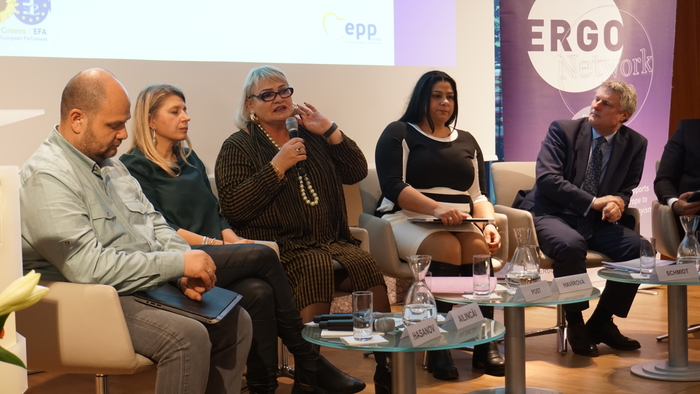ERGO NETWORK ANNUAL PUBLIC EVENT: Roma Access to Mainstream Education
This past 19 November, ERGO Network organised its annual public event, dedicated this year to debating how to ensure that Roma pupils and students can access mainstream education on equal footing and how to make education systems and establishments more inclusive, by combating segregation and discrimination in education settings. The event was co-organised with the generous support and participation of Hon. Romeo Franz MEP (Greens/EFA, Germany) and Hon. Peter Pollák MEP (EPP, Slovakia), and hosted at the premises of the Representation of the State of Baden-Württemberg to the European Union.
The event was very well attended with over 80 participants, and it brought together ERGO members from the grassroots level in 14 European countries, European civil society organisations and other Brussels-level stakeholders, as well as EU policy-makers from across the institutional spectrum, including the European Parliament, the European Commission, the Council of Europe, and the Government of Croatia, who will hold the upcoming Presidency of the Council of the EU.
Education is an increasingly important topic in the European public and political discourse, as an explicit objective of the Europe 2020 Strategy, the European Pillar of Social Rights, the Sustainable Development Goals, and the EU Framework for National Roma Integration Strategies. The latest communication issued by the European Commission on the Evaluation of the EU Roma Integration Strategies 2019, and its previous evaluations, clearly underline the need to prioritise education and training in policy initiatives. Several countries (BG, HU, RO, SK) received a Country-Specific Recommendation in 2019 regarding improving Roma access to quality education, as well as better integrating them into mainstream education.
However, this positive rhetoric still lacks the desired implementation, and the Roma are still too often left behind when it comes to accessing educational opportunities on equal footing with majority groups, due to structural antigypsyism and its manifestations in education, such as segregation. Existing legal and policy tools, including targeted actions on Roma education, as well as infringement procedures, are not as effective as they could be in challenging ingrained patterns of Roma exclusion and discrimination. From early childhood education and care to second-chance schools and informal education and to training and upskilling for the labour market, every person deserves the right to improve their competences and pursue their personal development.
The event included thought-provoking interventions which fostered a debate aimed at identifying positive solutions and policy proposals based on best practices, in order feed into the post-2020 policy and funding European frameworks relevant for Roma inclusion.
See more:
For more information about this event, or about ERGO Network’s work on inclusive education, please contact Senior Policy Adviser Amana Ferro.
 This conference was kindly supported by a grant from the Foreign Office of the Federal Republic of Germany.
This conference was kindly supported by a grant from the Foreign Office of the Federal Republic of Germany.
 ERGO Network receives financial support from the European Union Programme for Employment and Social Innovation EaSI (2014-2020). For further information please consult: http://ec.europa.eu/social/easi
ERGO Network receives financial support from the European Union Programme for Employment and Social Innovation EaSI (2014-2020). For further information please consult: http://ec.europa.eu/social/easi






